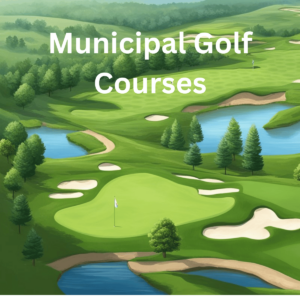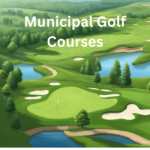Municipal golf courses, often referred to as “muni golf courses,” are a popular part of the golfing landscape throughout the United States due to their pricing and accessibility to local communities. Municipal golf courses are traditionally owned by a municipality or other government entity, ranging from the local city or county to even a state organization.
The primary purpose of municipal golf courses is to make the sport accessible to a wider audience, offering an affordable and enjoyable playing experience for golf enthusiasts of all skill levels.While private golf courses often require memberships and restrict access, muni courses are ideal for beginner and casual golfers or those looking to play a quick round without a membership commitment. Muni courses also cater to the local community by offering discounted rates for residents and promoting the growth and development of the sport within a specific community.
Key Takeaways
- Municipal golf courses are government-owned, making them more affordable and accessible to the public.
- Muni courses offer discounted rates to local residents (anyone within their tax jurisdiction), promoting community engagement in the sport.
- The primary goal of municipal golf courses is to improve the accessibility of golf for the local community.
1. Muni Golf Courses are Owned By a Government entity
Municipal golf courses, or “muni” courses, are owned and operated by state and local governments. As opposed to private courses, which are typically owned and run by a private individual or company, we believe that muni courses play a vital role in making golf accessible and affordable to the general public.
Because these courses are funded by the government, the goal is to foster community inclusivity, not turning a big profit.
Although the prices of muni courses can fluctuate considerably (some muni courses host major golf tournaments), muni courses offer more budget-friendly green fees, allowing a wider demographic of golfers to participate. This approach creates a more diverse environment and encourages prospective players who hesitate to play due to financial concerns.
Playing at a municipal golf course is a great way to help support local communities trying to foster a culture that appreciates and enjoys the game of golf. Embracing muni courses can fill the community with a sense of unity and enable new golfers to learn and grow on both personal and skill levels.
2. Municipal Golf Courses are open for anyone to play
Municipal golf courses, commonly referred to as “munis,” are golf courses owned and operated by local governments, making them more accessible and affordable to the general public. Unlike private courses, which often come with hefty membership fees and restrictions, munis welcome golfers of all skill levels, no matter your income or social standing. This inclusivity makes it an ideal option for those who are just starting out or on a limited budget. Additionally, many munis offer discounted rates for seniors, juniors, and residents, further incentivizing their use by the local community.
At the heart of municipal golf courses is their focus on broadening the sport’s appeal. By keeping course fees and greens fees low, they encourage golfers of all skill levels and backgrounds to pick up a club, learn the game, and experience the joys of a well-played round. This creates a diverse community of golf enthusiasts, fostering camaraderie and competition among players.
3. Muni Golf Courses Typically Offer Discounts to Residents
Municipal golf courses are owned by government entities, which allows them to offer discounts to local players unlike public courses. Since they are at least partially subsidized by taxpayer money, it’s common for these courses to provide discounts to residents of the state or county where the course is located. This helps make golf more affordable for a wider range of people.
The affordability and accessibility of municipal golf courses play a significant role in their popularity with the general public. With lower rates for locals, residents can take advantage of their tax dollars at work and experience the game without breaking the bank. Additionally, these courses often feature less crowded playing conditions, than highly trafficked public and private courses.
What is the difference between a municipal golf course and a public golf course?
Municipal golf courses are owned and operated by local governments, whereas public golf courses are owned by private individuals or companies (even though they are open to the general public).
Although both types of courses are open to all players, municipal courses typically offer better rates to local players. Because muni courses are funded by tax dollars, residents of the municipality often receive discounts on greens fees and other services at these courses.
On the other hand, public golf courses are owned by individuals or private companies. While they are open to the public, they operate with the intention of generating a profit. As such, they may not offer the same level of affordability as municipal courses, and will raise rates at popular times.
Accessibility is another factor that distinguishes municipal golf courses from public ones. Since municipal courses are government-owned, they generally cannot restrict access based on factors such as income, skill level, or residency. They are designed to be inclusive, welcoming players of all abilities and typically have programs that encourage new players to try golf. This traditionally takes to the form of offering programs and lessons for beginners.
In contrast, public golf courses might choose to cater to specific segments of the golfing population. While they also welcome golfers of varying skills, they might target specific groups through different marketing strategies or by offering specialized services.
What is the difference between a municipal golf course and a private golf course?
Municipal golf courses are owned and operated by local governments who allow anyone to play, whereas private courses are privately owned and generally restrict access to members only. Typically, municipal golf courses is that they are generally more affordable than private courses. Additionally, municipal golf courses often cater to a wider range of skill levels, so there is generally not pressure to play quickly.
Because, private golf courses are typically owned by companies, individuals, or golf clubs they tend to have more stringent rules (dress code, pace of play, access, etc). To play at a private course, you usually need to be a club member or be invited by a member. Private courses have membership requirements that may include application processes, sponsorship by current members, and sometimes, significant initiation fees and monthly dues.
One of the main advantages of private golf courses is the exclusivity they offer. With fewer players, tee times are more readily available, and the courses often provide a more personalized experience. Additionally, private clubs may offer an increased level of amenities, such as clubhouses, dining facilities, and practice areas that are only found at high quality golf courses.
What Are The Most Famous Municipal Golf Courses?
Although municipal golf courses are generally on the cheaper and more casual end there are several world class municipal golf courses we have played. Some of our favorites include:
- Bethpage Black in New York: This legendary course has hosted multiple major championships and is known for its challenging setup, demanding long and accurate drives from golfers. It is a public course, so anyone can have a chance to play where the pros play.
- Torrey Pines in California: Located in beautiful La Jolla, Torrey Pines is home to two golf courses – the North and South. The South Course is the more famous of the two and has hosted the U.S. Open. With stunning views of the Pacific Ocean, it’s easy to see why Torrey Pines is a favorite among golfers.
- TPC Harding Park in California: As a TPC property, this San Francisco course represents municipal golf at its finest. It has hosted several high-profile events, including the PGA Championship and the Presidents Cup. The course is challenging yet playable for golfers of all skill levels.
- Buffalo Dunes in Kansas: Located in Garden City, Kansas, Buffalo Dunes offers a unique, links-style experience in the heart of America. The course has garnered national attention for its exceptional layout and affordable rates.
Other notable mentions in the world of municipal golf courses include Papago Golf Course in Arizona, known for its stunning desert landscape, and North Palm Beach Country Club in Florida, which boasts a Jack Nicklaus Signature Design. These well-maintained courses give golfers of all levels a chance to experience top-quality golf at a fraction of the price of private clubs.
Have any major tournaments played at municipal golf courses?
Yes, major tournaments have been played at municipal golf courses. In fact, some of the most memorable championships have unfolded on these publicly accessible courses. For instance, Chambers Bay hosted the 2015 U.S. Open, which was organized by the United States Golf Association (USGA). This course, located in University Place, Washington, witnessed an intense battle for the title that eventually culminated in Jordan Spieth’s victory.
Another notable example is Memorial Park, a municipal golf course in Houston, Texas, that underwent a renovation by Tom Doak and Brooks Koepka. This park recently hosted the Vivint Houston Open, a PGA Tour event. Various big names in the golfing world, such as Tiger Woods and Jack Nicklaus, have participated in tournaments held at municipal golf courses, showcasing the ability of these courses to provide challenging and exciting play for both amateurs and professionals.
Municipal courses like Corica Park in Alameda, California, and Wilmington in Los Angeles have also been part of PGA Tour tournaments. Corica Park, in particular, has hosted several notable championships and has a well-regarded layout designed by the legendary architect, Rees Jones.
Frequently Asked Questions About Municipal Golf Courses
There are roughly 2,500 municipal golf courses in the United States. These courses are spread across the country, offering affordable access to the sport for countless people from various backgrounds.
Municipal golf courses provide affordable access to golfing facilities, welcoming players of all skill levels and backgrounds. We’ve found that these courses often have a relaxed atmosphere, providing an enjoyable environment for learning and improving your game. Additionally, the revenue generated by municipal golf courses helps fund local park systems, recreation centers, and other amenities, further enriching the communities they serve.
The process of converting a golf course into a municipal facility varies depending on the location and ownership structure. Generally, a municipal golf course can be formed through a public-private partnership or through direct public ownership. A local government works together with stakeholders, such as course operators, developers, and community members to develop the course, ensuring its accessibility and sustainability for long-term use. In our experience, a key factor in this process is the willingness of the community to invest in and support the development of a municipal golf course.
While municipal golf courses are designed to be accessible to the general public, many do offer membership options. Memberships typically include benefits such as preferred tee times, discounted green fees, and access to special events or tournaments. We’ve found that memberships can be an excellent way for frequent golfers to save money and fully enjoy the perks that municipal golf courses have to offer. However, it’s important to note that membership options vary by course. So, always check with your local municipal golf course to learn more about their specific offerings.







